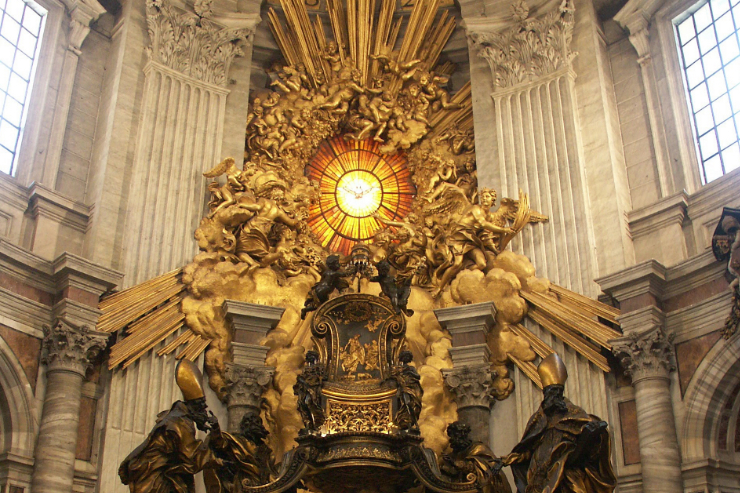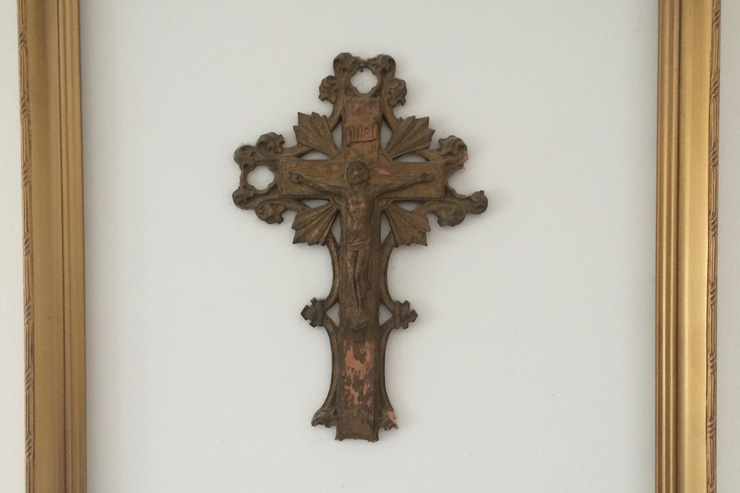Today we celebrate the feast of the Chair of St. Peter. The Gospel for the feast is Matthew’s account of the events at Caesarea Philippi, where Peter receives the mission from Jesus to lead His Church. This year, we happened to hear Mark’s account of the incident just yesterday, on the Thursday of the 6th Week of Ordinary Time. It is shorter than Matthew’s account, glosses over the primacy of Peter, and instead seems to focus on the event that comes a few verses later in Matthew’s account – the rebuke of Peter (Mt 16:23 and Mk 8:33).
The focus of Mark’s account is interesting because tradition tells us that Peter himself was the source of Mark’s Gospel. In his humility, Peter stresses not the primacy incident at Caesarea Philippi but the rebuke. Since early scholars agree that Matthew’s Gospel was the first in circulation, perhaps Peter figured they didn’t need to emphasize his primacy again in Mark’s account. But he was willing to have Mark point out the rebuke again.
On this feast of the Chair of St. Peter, we celebrate this primacy of Peter. We celebrate the Office of the Papacy. We thank God that He did not leave us orphans. Jesus didn’t come to hang out on this earth for three years, teach the Apostles and the crowds, save us through His Passion, and then leave this earth just leaving it to chance that the future generations would figure it out. Rather, He established a Church to evangelize the world: by giving the Apostles the power to teach and preach and sending the Holy Spirit to guide them.
Today we celebrate this Feast of a Chair – not an object of furniture, but a sign of love. Pope Benedict wrote, “Celebrating the ‘Chair’ of Peter, therefore, as we are doing today, means attributing a strong spiritual significance to it and recognizing it as a privileged sign of the love of God, the eternal Good Shepherd, who wanted to gather his whole Church and lead her on the path of salvation.”
God didn’t entrust this message and mission to angels or to sinless beings. He entrusted it to twelve men. Twelve men who often misunderstood him. Twelve men who often acted foolishly. 92% of those first bishops would either outright betray Him or at least abandon Him in His hour of need. Our first bishops were human. Our first Pope was human. And every single leader of the Church after them is human too. This doesn’t excuse their sins, but it does explain them. We are humans led by humans. And we beg God to make us all saints.
What does this feast remind us? That God, in His goodness, does not leave us orphan. He may allow us to be led by prideful John who argued over who was greatest. But He also gives us courageous John who stood by the Cross to the end. He gives us Peter who rashly rebuked the Lord. And He gives us Peter who heroically went to his death on his own Cross for our Lord.
As members of this Church, we must ask ourselves: what have to done to help the Pope and leaders of the Church? How have I prayed and sacrificed for them? Jesus Himself prayed for Peter at the Last Supper: “Simon, Simon, behold Satan has demanded to sift all of you like wheat, but I have prayed that your own faith may not fail; and once you have turned back, you must strengthen your brothers” (Luke 22:31-32).
Are you praying for them? Father Fernandez reminds us, “There is a very ancient prayer that the faithful can use to pray for the Bishop of the diocese they happen to be in: Stet et pascat in fortitudine tua, Domine, in sublimitate nominis tui. The Pastors of the Church are always in great need of divine help in order to carry out their mission. We have the responsibility of helping them, so we ask God to sustain them and help them to tend his flock with divine fortitude and with the gentleness and sublime wisdom that comes from Heaven” (Fernandez, In Conversation with God).
We celebrate the Chair of Peter today, but we also remember our own responsibilities as members of the flock: to pray, sacrifice, and do penance for our Shepherds.















